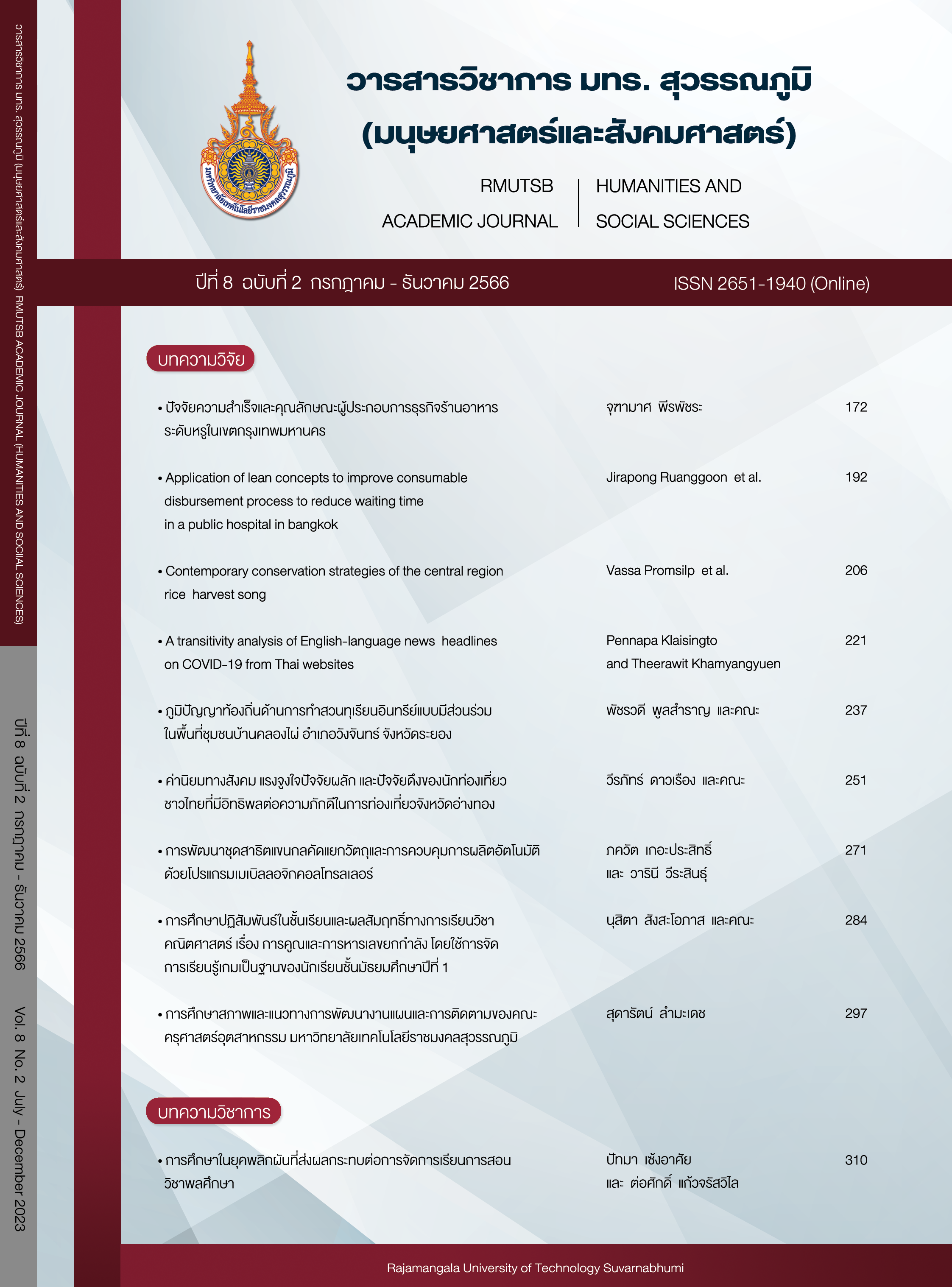A study of classroom interaction and mathematics learning achievement on multiplication and division of exponents by game-based learning of 7th grade students
Main Article Content
Abstract
The objectives of this research were 1) to study the classroom interaction of 7th grade students after game-based learning on multiplication and division of exponents, 2) to compare the mathematics learning achievement of 7th grade students after learning management on multiplication and division of exponents with a game-based learning compared to the criteria of 70 percent, and 3) to compare the mathematics learning achievement of 7th grade students before and after learning management on multiplication and division of exponents with a game-based learning. The sample group was Mathayomsuksa 1/7 students in Benchamatheputhit Phetchaburi School. The instruments for collecting data consist of game-based learning plan, mathematics achievement test, classroom interaction questionnaire, and classroom interaction observation form. Data were analyzed using t-dependent samples test. The research results were summarized as follows: 1) classroom interaction of 7th grade students after game-based learning was at very good level, 2) mathematics learning achievement of 7th grade students after learning management on multiplication and division of exponents with a game-based learning was 70% higher than the criteria at the 0.01 level of significance, and 3) mathematics learning achievement of 7th grade students on multiplication and division of exponents with a game-based learning after learning was higher than before learning at the 0.01 level of significance.
Article Details

This work is licensed under a Creative Commons Attribution-NonCommercial-NoDerivatives 4.0 International License.
References
Bunlikhitsiri, B. (2005). Effects of types of learning interaction on game-based training via web upon learning achievement of personnel officers in Center for Information Technology and Communication services, Naresuan University (Master’s thesis). Chulalongkorn University, Bangkok. (in Thai)
Boonchum, W. (2007). Using communicative activities to promote English listening-speaking abilities and classroom interaction of hill tribe students (Master’s thesis). Chiang Mai University, Chiang Mai. (in Thai)
Hanum, N. S. (2017). The importance of classroom interaction in the teaching of reading in junior high school. Retrieved 10 February 2022, from https://www.semanticscholar.org/author/Naimah-Susani-Hanum/1486208575.
Ilhan, A. (2021). The impact of game-based, modeling, and collaborative learning methods on the achievements, motivations, and visual mathematical literacy perceptions. SAGE Journal, 11(1), 1-17.
Intasara, W. (2019). Game based learning the latest trend education 2019, Turning a classroom into a playroom Game Based Learning. Bangkok: Suan Dusit University. (in Thai)
Khaemmanee, T. (2021). Teaching: Knowledge for organizing effective learning processes. Bangkok: Chulalongkorn University. (in Thai)
Kongiat, P. (2019). Using game for the development of mathematics achievement on substance classification of primary 2 at Tessaban 8 Anubanfunteepenching School Trang Province (research report). Nakhon Si Thammarat: Southern College of Technology. (in Thai)
Ministry of Education. (2017). Basic education core curriculum B.E. 2008 revised B.E. 2017. Bangkok: Office of Academics and Educational Standards, Office of the Basic Education Commission. (in Thai)
Muangmungkung, J. (2017). Using games in mathematics learning activities to promote critical thinking skill of Mathayom Suksa 1 Students (Master’s thesis). Chiang Mai University, Chiang Mai. (in Thai)
Nakasan, N., & Nakasan, C. (2016). Game: Innovation for creative education. Romphruek Journal, 34(3), 159-182. (in Thai)
Ngernsai, P. (2014). Using communication process to promote mathematics classroom interaction of Mathayom Suksa 2 Students, Sobmoeiwittayakom School, Mae Hong Son Province (Master’s thesis). Chiang Mai University, Chiang Mai. (in Thai)
Padungprasert, R. (2022). A study of learning achievement on application of conversion of "8" ^"th" grade students by learning management based on the STEM education together with game-based teaching methods. RMUTSB Academic Journal (Humanities and Social Sciences), 7(2), 180-195. (in Thai)
Pandach, T. (2018). Developing the upper secondary school students’ mole and chemical formula concepts using game-based learning (Master’s thesis). Chulalongkorn University, Bangkok. (in Thai)
Phiwma, N. (2021). Learning management using game-based learning by intergrating computer game technology. Journal of Humanities and Social Sciences Rajapruk University, 7(Suppl.), 1-15. (in Thai)
Pimpakhun, K. (2022). Creating a board game that affected learning achievement on essential factors of plants’ life for grade 2 students. RMUTSB Academic Journal (Humanities and Social Sciences), 7(1), 109-119. (in Thai)
Sritanoi, W. (2018). The effects of mathematics learning activities of Prathom Suksa Four Students on “money” by using games – based learning. STOU Education Journal, 11(1), 104-115. (in Thai)
Thinhanwong, S. (2015). Participatory learning: from theory to practice in children’s literature course. Journal of Humanities and Social Sciences Review, 17(1), 1-11. (in Thai)
Thongdee, O. (2020). The effect of learning management by using academic game on learning achievement in towards mathematics of Prathomsuksa 1 Students (research report). Nakhon Sawan: Nakhon Sawan Rajabhat University. (in Thai)
Yamkuan, L. (2017). The using of game-based learning for promote mathematics process skills of "6" ^"th" Grade Students. Journal of Information Science and Technology, 7(1), 33-41. (in Thai)


